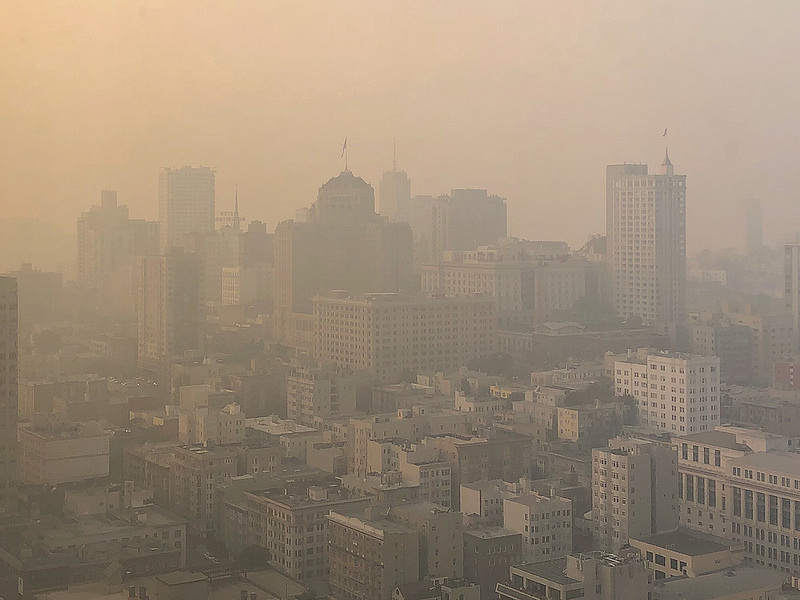世界衛生組織(WHO)在聯合國COP24氣候大會上發表「特別報告」指出,光是透過減少空氣污染來實現《巴黎協定》目標,到2050年全球每年可挽救約100萬人的生命。
空氣污染每年導致全球700萬人死亡,全球福利損失估計為5.11兆美元。專家估計,氣候行動帶來的健康效益價值大約是全球緩解政策成本的兩倍。中國和印度等國家的成本效益比率甚至更高。

WHO的報告解釋了公衛因素如何攸關氣候行動的推動,並詳細說明給決策者的主要建議。
在溫室氣體排放量前15名的國家中,空氣污染對健康的影響超過其國內生產總值的4%。實現巴黎協定目標將花費全球GDP的1%左右。
「巴黎協定可能是本世紀最強大的公衛協定,」WHO總幹事譚德羅(Tedros Adhanom Ghebreyesus)博士說。
「證據顯示,氣候變遷已經嚴重影響人類生命和健康,威脅人類健康所需的基本要素-乾淨的空氣、安全的飲用水、營養糧食的供應和安全的住所,並將破壞數十年來全球公衛的進展。我們不能再拖延行動,」譚德羅博士說。
破壞地球氣候穩定的人類活動也直接導致健康狀況不佳。氣候變化的主要驅動因素是化石燃料燃燒,這也是空氣污染的主要原因。
「我們的醫院和肺臟對氣候變遷的代價最有感。現在高污染能源的健康負擔如此之高,轉型乾淨永續能源、運輸和食品系統實際上能創造收益,」WHO公衛、環境和社會決定因素主任尼拉(Maria Neira)博士說,「對公衛問題來說,減緩氣候變遷是一個機會而不是成本。」
轉型低碳能源不僅可以改善空氣品質,還可提供直接的健康益處。例如,主動運輸(如騎自行車)有助於增加身體活動、預防糖尿病、癌症和心臟病等疾病。
WHO的《COP24特別報告-健康與氣候變遷》向各國政府說明如何將對抗氣候變遷的健康效益發揮到最大,並避免健康衝擊。
報告中描述了世界各國現在如何採取氣候行動保護地球上的生命,只是規模仍然嚴重不足,開發中的小島國家和發展程度最低的國家尤其如此。專門用於適應氣候變遷的多邊氣候資金中,只有約0.5%用於公衛計畫。
太平洋島國僅貢獻0.03%的溫室氣體排放,受氣候變遷影響最嚴重。對於太平洋島國來說,氣候變遷緊急行動,包括本週COP24的談判結果,對其人民的健康和生存至關重要。
WHO現在已清楚了解該怎麼做,才能在氣候變遷之下守護公共衛生,包括更具彈性和永續的醫療設施,以及改善極端天氣和傳染病爆發的預警系統,而缺乏投資會將最脆弱的人群拋在後頭。
報告呼籲各國在減緩氣候變遷的所有成本效益分析中納入健康因素,建議各國利用碳定價和能源補貼等財政激勵措施來激勵產業減少溫室氣體和空氣污染物的排放。
根據報告,聯合國氣候變遷綱要公約(UN Framework Convention on Climate Change, UNFCCC)締約方可透過以下方式推進氣候、健康和發展目標:
-
找出並推動減少碳排放和空氣污染的行動,並在其國家自主貢獻中納入減少短期氣候污染物排放的具體承諾。
-
確保在聯合國氣候變遷綱要公約和巴黎協定中評估和保障健康的承諾,能反映在國家和全球層面的運作機制中。
-
消除適應氣候變遷的健康投資障礙,關注氣候適應性公衛系統和氣候智慧醫療設施。
-
與衛生界、民間社會和衛生專業人員接觸,幫助他們動員,促進氣候行動和健康的綜效。
-
在UNFCCC框架內,促進城市和地方政府在有利健康的氣候行動中的作用。
-
正式監測和報告氣候行動對全球氣候和衛生治理的進展,以及在聯合國永續發展目標上的進展。
-
在經濟和財政政策中納入減緩和適應措施的健康影響。
Meeting the goals of the Paris Agreement on climate could save about a million lives a year worldwide by 2050 through reductions in air pollution alone, finds a new World Health Organization report released today at COP24, the ongoing UN climate conference.
Experts estimate that the value of health gains from climate action would be roughly double the cost of mitigation policies at the global level. The benefit-to-cost ratio is even higher in countries such as China and India.
Exposure to air pollution causes seven million deaths worldwide every year and costs an estimated US$5.11 trillion in welfare losses globally.
The WHO report explains why health considerations are critical to the advancement of climate action and details key recommendations for policy makers.
In the 15 countries that emit the most greenhouse gases, the health impacts of air pollution are estimated to cost more than four percent of their GDP. Actions to meet the Paris goals would cost around one percent of global GDP.
"The Paris Agreement is potentially the strongest health agreement of this century,"said Dr. Tedros Adhanom Ghebreyesus, WHO director-general.
"The evidence is clear that climate change is already having a serious impact on human lives and health. It threatens the basic elements we all need for good health – clean air, safe drinking water, nutritious food supply and safe shelter – and will undermine decades of progress in global health. We can't afford to delay action any further,"Dr. Tedros said.
The same human activities that are destabilizing the Earth's climate also contribute directly to poor health. The main driver of climate change is fossil fuel combustion which is also a major contributor to air pollution.
"The true cost of climate change is felt in our hospitals and in our lungs. The health burden of polluting energy sources is now so high, that moving to cleaner and more sustainable choices for energy supply, transport and food systems effectively pays for itself,"says Dr. Maria Neira, WHO director of public health, environmental and social determinants of health.
"When health is taken into account, climate change mitigation is an opportunity, not a cost,"she said.
Switching to low-carbon energy sources will not only improve air quality but provide opportunities for immediate health benefits. For instance, introducing active transport options such as cycling will help increase physical activity that can help prevent diseases like diabetes, cancer and heart disease.
WHO's COP24 Special Report: Health and Climate Change provides recommendations for governments on how to maximize the health benefits of tackling climate change and avoid the worst health impacts.
It describes how countries around the world are now taking action to protect lives from the impacts of climate change – but that the scale of support remains woefully inadequate, particularly for the small island developing states, and least developed countries. Only approximately 0.5% of multilateral climate funds dispersed for climate change adaptation have been allocated to health projects.
Pacific Island countries contribute 0.03% of greenhouse gas emissions, but they are among the most profoundly affected by its impacts. For the Pacific Island countries, urgent action to address climate change — including the outcome of COP24 this week — is crucial to the health of their people and their very existence.
WHO officials now have a clear understanding of what needs to be done to protect health from climate change – from more resilient and sustainable healthcare facilities, to improved warning systems for extreme weather and infectious disease outbreaks – but the lack of investment is leaving the most vulnerable people behind.
Recommendations From WHO's COP24 Special Report: Health and Climate Change
The report calls for countries to account for health in all cost-benefit analyses of climate change mitigation.
It recommends that countries use fiscal incentives such as carbon pricing and energy subsidies to incentivize sectors to reduce their emissions of greenhouse gases and air pollutants.
The report says Parties to the UN Framework Convention on Climate Change, UNFCCC, could advance climate, health and development objectives by:
* – Identifying and promoting actions that both cut carbon emissions and reduce air pollution, and by including specific commitments to cut emissions of Short Climate Pollutants in their National Determined Contributions.
* – Ensuring that the commitments to assess and safeguard health in the UNFCCC and Paris Agreement are reflected in the operational mechanisms at national and global levels.
* – Removing barriers to investment in health adaptation to climate change, with a focus on climate resilient health systems, and climate smart healthcare facilities.
* – Engagement with the health community, civil society and health professionals, to help them to mobilize collectively to promote climate action and health co-benefits.
* – Promoting the role of cities and sub-national governments in climate action benefiting health, within the UNFCCC framework.
* – Formal monitoring and reporting of the health progress resulting from climate actions to the global climate and health governance processes, and the United Nations Sustainable Development Goals.
* – Inclusion of the health implications of mitigation and adaptation measures in economic and fiscal policy.
※ 全文及圖片詳見:ENS
※ COP24 Special Report: Health and Climate Change





